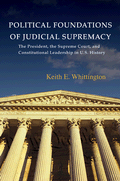
Political Foundations of Judicial Supremacy: The Presidency, the Supreme Court, and Constitutional Leadership in U.S. History
Type
The judicial authority to give definitive meaning to the Constitution has often been asserted by the U.S. Supreme Court, but making those assertions real has been a political project that has unfolded over the course of American history. Judicial supremacy over other political actors in the authoritative interpretation of the Constitution was not established at the time of the Founding but had to be won within American political development. These claims of judicial authority have often been contested, and the Court has been successful in advancing those claims to the extent that judicial supremacy has been useful to other powerful political officials, most notably the president. The Supreme Court has shared constitutional leadership over time with the president. The relative authority of the Court is dynamic, not fixed. To understand the judicial power of constitutional interpretation, we must understand the Court's place within American politics. Judicial supremacy rests on political foundations.
Awards: Winner of the C. Herman Pritchett Award for best book in Law and Politics
Awards: Winner of the J. David Greenstone Award for best book in Politics and History
Praise: "Historically comprehensive and analytically astute, Whittington's sweeping reformulation of the role of the Supreme Court alters our entire view of American government." -- Stephen Skowronek, Yale University

